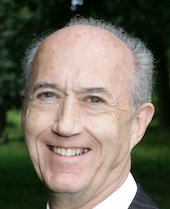Peter Madelaine is retired and studying Maths, Physics and Astronomy at The Open University. He is an active astronomer and is involved in public outreach. Before retiring, Peter worked in the software industry and was a university lecturer in computing.
I’m 68, and I’m studying for a degree at the Open University. All being well, I will be 70 when I get my degree. My friends think I’m mad. Most people, of my age, are “hanging up their boots” and looking forward to a life of leisure. Not only that, I’m studying Maths, Physics and Astronomy! The other day, I declined a golf game, to concentrate on an assessment. My friend asked: “Why do you put yourself under this pressure?” It’s a good question, I suppose.
“Show me the boy before he is seven, and I will show you the man”. (Actually I believe psychologists think the age is nearer ten, but the principle appears established.) At the age of eight, I was recognised as a potential mathematician, and by then I had decided that I wanted to be a scientist and/or inventor. I got the latter, not from school, but from my parents.
My father was a radio and TV engineer with a broad, secondary education background in the sciences. My mother had wanted to be a doctor, but had been persuaded to train as a nurse. Neither parent grew up with adequate financial resources to release their potential in the educational climate of the early 20th century. At home, I was encouraged to take an interest in the range of sciences that my parents had embraced. Father used to repair electrical things, radios etc. and even built our first television (from salvaged components) at home. I was particularly interested in how things worked and were constructed.
The only children’s paper I was allowed was “The Eagle”, with its front page story about space travel. At 10, I knew a little about the composition of the atmosphere, a little basic anatomy, about chemical symbols, that water was H2O, how to solder electrical components and what the components of a radio were. And, of course, I knew a little about the planets. I couldn’t understand, at the time, why others didn’t share my enthusiasm for all these fascinating things.
We were taught nothing (so far as I can remember) about science at primary school. A sickly child, I missed a lot of primary school and failed the common entrance exam. So my mother went back to work and I was sent to boarding school in North Wales. To mitigate the boredom of a restricted lifestyle I started going to the local library, and having learnt a little about atoms and astronomy, in general science lessons, I sought out books about atomic structure and astronomy, and was hooked. So by the age of 14, I knew I wanted to be a nuclear physicist. About that time Sir Patrick Moore started broadcasting on the BBC, further reinforcing my interest in astronomy. I left school with A levels in Pure Maths, Physics and Applied Maths. Fate then took a hand, and I ended up working in the aeronautics industry, where somebody taught me computer programming.
One thing led to another and I had a lifelong career in commercial software application development and computer services management. The final 5 years of my official working life were engaged in lecturing on a BSc (Hons) course in computing and other computing-related FE/HE courses. (That was an eye-opener in many respects!) Over the intervening years, I kept in touch with science via the TV documentaries, fascinated by the new ideas, and longing to own a telescope.
Following retirement and divorce, preceded by the fledging of my two sons (one is a science teacher) I had to do something with my overactive brain. As my computing career became a distant memory, I returned to my original interest: Physics. As a practised problem solver, I love a mystery, so the continuing challenges, of trying to understand the universe, fascinate me as much, today as when I was a teenager. And so to the present day: my studies are aimed at equipping me for research in particle physics. And, yes, I have a telescope.
What can be drawn from my experience? When I was a schoolboy, careers were thought of as later-years secondary school topics, whereas it appears that primary school age is, perhaps, the time to introduce careers, albeit at an introductory level. I am not an expert on demographics, but I believe it can be shown that about 15% of the population has some interest in science. Given that, and my background as an example, suggests that perhaps 85% of children, at primary school age, are prevented from considering a career in science, because they have no real awareness of it, due to lack of parental interest. That, and the “before he is seven” syndrome, I believe, places a heavy burden on primary education, to contribute towards solving this problem. Although, mass-market TV programmes could also be a vehicle for generating interest. (I suggest that science programmes are only watched by people who already have an interest in science.)
The key facets in my interest in science can be summarized as: excitement from the idea of space travel, fascination with the sheer scale of the universe, intrigue in how things work and are constructed, the discovery of all the things that can be worked out using maths. These concepts are largely demonstrable, which, you will all appreciate, are key to generating enthusiasm at primary education level.
 Published by
Published by